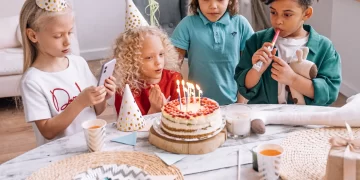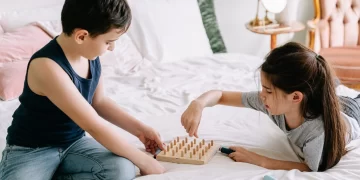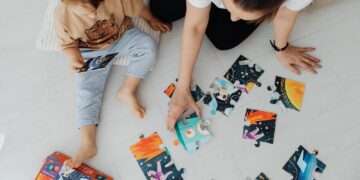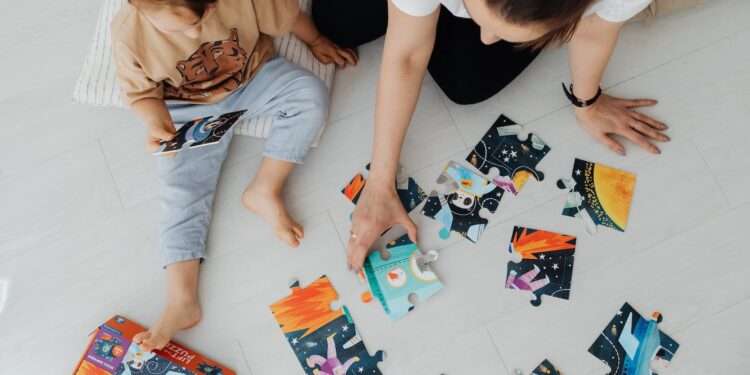
What Is Children’s Mental Health?
Children’s Mental health in childhood means reaching developmental and emotional milestones, learning healthy social skills, and how to cope when there are problems. Mentally healthy children have a positive quality of life and can function well at home, in school, and in their communities.
Mental disorders among children are described as serious changes in the way children typically learn, behave, or handle their emotions, which cause distress and problems getting through the day. Many children occasionally experience fears and worries or display disruptive behaviors. If symptoms are serious and persistent and interfere with school, home, or play activities, the child may be diagnosed with a mental disorder.
As parents, caregivers, and educators, we want to ensure that our children grow up healthy and happy. But in a world flooded with digital devices and toys of all kinds, what is the real impact on our children’s well-being? In this topic, The effects of games and toys on children’s mental health, using a simple, conversational tone to break down this complex issue into understandable terms. We’ll examine both the positive and negative aspects and provide insights that can help you make informed decisions. So, let’s get started!
What is the impact of mental health on children?
Mental health is important to overall health. Mental health are chronic health condition—conditions that last a long time and often don’t go away completely—that can continue through the lifespan. Without early diagnosis and treatment, children with mental disorders can have problems at home, in school, and in forming friendships. Mental disorders can also interfere with a child’s healthy development, causing problems that can continue into adulthood.
The Importance of Play for Children’s Mental Health:
Children’s Play is often seen as a fun and frivolous activity, but its significance goes far beyond mere entertainment. In fact, play is a fundamental aspect of a child’s development and has a profound impact on their mental health and overall well-being. As parents, understanding the importance of toy play and actively encouraging it in your children’s lives can foster their emotional, social, cognitive, and physical growth. Let’s explore the reasons why play is crucial for children’s mental health and provide practical tips for incorporating play into their daily lives.
Emotional Development:
Play provides children with a safe space to explore and express their emotions. Through play, children can act out different scenarios, experiment with various roles, and process their feelings. Whether it’s engaging in imaginative play, engaging in art or music, or playing with toys, children learn to identify, regulate, and communicate their emotions effectively. Play also promotes resilience by allowing children to navigate challenging situations, make decisions, and problem-solve, building their emotional intelligence and coping skills.
Social Development:
The play offers valuable opportunities for children to develop their social skills and build relationships. When children engage in play with their peers, they learn to take turns, cooperate, negotiate, and resolve conflicts. Play also helps develop empathy and understanding as children learn to consider others’ perspectives and navigate social dynamics. By engaging in group play or team activities, children develop important skills such as communication, collaboration, and teamwork, which are essential for healthy relationships throughout life.
Cognitive Development:
Play is a powerful tool for enhancing cognitive abilities and fostering intellectual growth. Whether it’s building blocks, solving puzzles, or engaging in pretend play, children engage their minds and develop problem-solving, critical thinking, and creative skills. Play encourages curiosity, exploration, and experimentation, helping children to make connections, develop a thirst for knowledge, and build a strong foundation for future learning. It also enhances memory, concentration, and attention span, promoting overall cognitive development.
Physical Development:
Play is inherently active, allowing children to engage in physical movements and develop their gross and fine motor skills. Outdoor play, sports, and active games promote physical fitness, coordination, and strength. Fine motor skills are enhanced through activities like drawing, painting and playing with small objects. Physical play also releases endorphins, reducing stress and promoting a sense of well-being. Regular physical play can lay the foundation for a healthy lifestyle and contribute to better physical and mental health outcomes in the long run.
Stress Reduction:
In our fast-paced and demanding world, children face various stressors that can impact their mental health. Play serves as a natural stress reliever, allowing children to unwind, release tension, and recharge. When engaged in play, the focus shifts from daily pressures to the present moment, promoting relaxation and a sense of joy. Play provides a healthy outlet for emotions and helps children manage stress and anxiety, enhancing their overall resilience and mental well-being.
It’s completely understandable if you find it challenging to integrate play into your child’s life. We completely empathize with the busyness that comes with parenting, making it difficult to determine the most effective strategies for facilitating quality playtime. However, it’s crucial to keep in mind that even small efforts can yield remarkable results and make a significant impact on your child’s well-being and development. By embracing and prioritizing these moments of play, you’re nurturing their imagination, creativity, and overall growth in meaningful ways.
Below are some practical tips and strategies for incorporating play into your child’s life:
Create a designated play area: You can set up a dedicated space in your home where your child can explore, imagine, and play freely. This area can be stocked with toys, books, and materials that encourage their interests and stimulate their creativity.
Schedule playtime: Set aside specific periods each day for uninterrupted playtime with your child. This dedicated attention and engagement from you can enhance their sense of security and deepen their enjoyment of play.
Provide open-ended toys and materials: Offer toys and materials that promote open-ended play, such as building blocks, art supplies, and dress-up costumes. These items allow for limitless possibilities, sparking their imagination and problem-solving skills.
Encourage unstructured play: Allow your child to engage in unstructured, child-led play where they have the freedom to explore their own ideas and interests. Avoid excessive rules or instructions that may stifle their creativity.
Join in their play: Show genuine interest in your child’s play by participating alongside them. This not only strengthens your bond but also models positive social interaction and encourages their engagement.
Support diverse play experiences: Introduce a variety of play experiences to broaden their interests and skills. This can include outdoor play, sensory play, pretend play, and cooperative games with other children.
Limit screen time: Set reasonable boundaries on screen time to ensure that your child has ample opportunities for hands-on, imaginative play that stimulates their cognitive, physical, and emotional development.
Foster a supportive play environment: Create an environment where play is valued and encouraged. Be attentive to your child’s cues, offer praise and encouragement, and provide a safe and nurturing space for them to explore and take risks.
Arrange playdates or social opportunities: Organize playdates with other children or enroll your child in group activities like sports or art classes. These interactions promote social skills, cooperation, and the joy of shared play experiences.
Be a play advocate: Educate yourself about the importance of play in child development and advocate for its significance within your family and community. Share resources and information with other parents to spread awareness about the benefits of play.
Encourage outdoor play: Nature provides a rich and stimulating environment for play. Encourage outdoor activities like exploring parks, going for hikes, or simply engaging in unstructured play in the backyard. Fresh air and natural surroundings have been shown to enhance mood and reduce stress.
Embrace risk and mistakes: Allow children to take age-appropriate risks during play and understand that making mistakes is part of the learning process. Encourage a growth mindset, emphasizing effort, persistence, and problem-solving rather than focusing solely on outcomes.
By implementing these tips and prioritizing gaming play in your child’s life, you can create an environment where they can explore, discover, and thrive while nurturing their mental health and overall well-being.
Classic Toys with Mental Health Benefits for Children
If you take a peek into any play therapist’s office, you’re probably not going to see any of these hot new toys for babies, no matter how wholesome or beneficial they claim to be. What you’ll see are classic toys you probably remember from your own childhood: no frills, no bells and whistles, and probably no batteries required. If you’re looking to stock your child’s home playroom, here are classic toys that encourage emotional growth and promote good mental health.
Baby Dolls Help Children Learn to Nurture:
Rocking, feeding, dressing, and bathing…baby dolls teach children how to empathize and care for others. Parents have to learn how to respond to their babies’ cues in order to give them what they need. When children play make-believe with dolls, they’re using their imaginations to practice this same important social skill.
Interestingly, when your kids pretend to soothe and nurture a baby doll, they’re also soothing and nurturing themselves. In play therapy, kids who have had difficult experiences in early life can use baby dolls to reconnect with a feeling of being cared for and loved. This probably goes without saying, but kids of all genders can benefit from playing with baby dolls: if we want all our kids to be loving parents and empathetic people, they need practice to develop these skills!
Play-Doh Encourages Sensory Awareness
I’ve written a lot in this blog about the not-so-hidden mental health benefits of the slime craze…I am all in on slime and it’s a staple in my play therapy room. But if you aren’t as thrilled by the idea of dried glue on every upholstered surface of your home, maybe Play-Doh—slime’s older, less trendy cousin—is more your speed. Play-Doh and other similar products, like modeling clay or kinetic sand, provide kids with a great opportunity to engage in sensory play.
Sensory play activities help kids get in touch with their 5 senses: scented markers, musical toys, and water tables are all great examples of toys that give kids interesting sensory experiences that go beyond sight. This type of play has been shown to help with motor and language development, but it offers benefits for emotional health, too.
Focusing on sensory input is a form of mindfulness, similar to paying attention to the breath while meditating. Kids tend to get very absorbed in sensory play because they’re super aware of what’s happening in the present moment, rather than multitasking or letting their minds wander to other thoughts. This can have a soothing and focusing effect on kids who are feeling anxious and scattered.
Dress-Up Clothes Let Kids Try Out New Possibilities
Playing dress-up is more than just make-believe fun. Putting on a costume allows kids to test-drive new ways of thinking, behaving, and interacting with others. Playing dress-up is a form of roleplay, that drama therapists often use as a mental health tool with both children and adults. Drama therapists believe that we all have roles we play in life that dictate our behavior: we probably behave pretty differently at school, at work, with our families, and when out with friends, for example. Children are still learning the social and emotional skills they need to operate in all these different settings, and dress-up gives them a chance to practice.
Thinking about the kinds of costumes kids choose for Halloween can provide good insight into the types of dress-up clothes that can be helpful for emotional growth. “Real life” costumes like doctor and firefighter outfits help kids emulate adults in their lives, explore their interests, and develop a sense of responsibility. Superhero costumes are awesome for building self-esteem and self-confidence: who doesn’t want to feel like Superman or Wonder Woman for a day?
Even villain costumes have a function for kids, allowing them to experience feeling powerful and letting out aggressive energy in a safe and playful way. Consider stocking up on at least one costume in each of these three categories if you’re building a dress-up area for your child at home.
Toy Weapons Help Kids Vent Anger Safely
Whether or not kids should be allowed to have toy guns is a pretty fraught subject, and many schools, daycares, and parents have decided to ban them. It’s a complicated issue, and these days there are a lot of reasons why it may not be a good idea for kids to have toy weapons in public places. Nevertheless, I think there are some good reasons why toy weapons can actually be beneficial for mental health when used in a therapy playroom or at home.
Many parents are worried that playing with toy guns will encourage violent tendencies in children. I used to wonder about this, too! However, the research shows this isn’t the case: kids who play with toy guns do not grow up to be more aggressive than kids who don’t. In fact, playing out war or fight scenes may help children learn how to better understand and control their own anger. Children play things out in order to better understand them and to develop a sense of control over their surroundings. When kids act out angry scenes, they are learning how to handle their own anger and safely express it in ways that don’t hurt people in real life.
Play therapists often say that “toys are a child’s words”, because kids often use play, rather than language, to work through their thoughts and feelings. Sadly, many kids enter play therapy after witnessing violence, and they often need toy weapons available to give them the “vocabulary” they need to express themselves. If toy guns feel too risky to have at home, consider getting a very childish, non-realistic Nerf gun or another play weapon such as a sword, instead.
Play Kitchens Strengthen Parent-Child Bonds
Almost every child I’ve ever worked with in play therapy has enjoyed making pretend food to serve their parents in the play kitchen. Children imitate their parents as a sign of affection: they want to be just like you! Many kids see their parents preparing food all day long and play kitchens give kids a chance to step into that grown-up role for themselves.
Similar to the baby dolls I mentioned earlier in this post, play kitchens give kids a chance to practice nurturing and caring behavior. Plenty of kids use the play kitchen to make meals for their dolls and toys, but play kitchens also get kids interacting more with parents or other adults in the playroom. In many families, food is love. Even though play kitchen food is pretend, serving food to parents or other special people gives kids a chance to express their own love and care. In play therapy, this kind of interactive, open-ended play is wonderful for helping kids and parents reconnect and increase feelings of attachment.
FAQ
1. How much screen time is safe for children’s mental health?
For children aged 2 to 5, the American Academy of Pediatrics recommends limiting screen time to one hour per day of high-quality programming. For older children, it’s essential to balance screen time with other activities.
2. What are some warning signs of mental health issues in children?
Watch out for changes in behavior, extreme mood swings, withdrawal from social activities, and a decline in academic performance. These can be indicators of underlying mental health concerns.
3. How can parents promote social development through play?
Parents can encourage social development by arranging playdates, engaging in cooperative games, and fostering communication skills. Encouraging sharing and empathy is also essential.
4. Are there video games that can be beneficial for children’s mental health?
Yes, certain video games, such as those focused on problem-solving or relaxation, can have a positive impact on children’s mental health. It’s important to choose age-appropriate and non-violent games.
5. What role does physical activity play in a child’s mental health?
Physical activity is crucial for a child’s overall well-being. It promotes physical fitness, releases endorphins, and reduces stress, which all contribute to a positive mental state.
Conclusion: Mental health is a state of mental well-being that enables people to cope with the stresses of life, realize their abilities, learn well and work well, and contribute to their community. In a world filled with choices, the impact of games and toys on children’s mental health is a topic that demands attention. By understanding the nuances of play, screen time, and the role of parental involvement, we can ensure that our children grow up mentally strong, happy, and well-prepared for the challenges of life. So, let’s keep playing, but with knowledge and balance. visite us on our webstore kidsmodelista shop


































